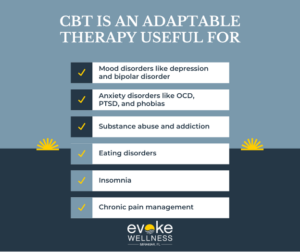As you consider treatment options for a loved one struggling with addiction and mental health challenges, cognitive behavioral therapy (CBT) offers research-backed solutions. This therapeutic approach helps people identify and change dysfunctional thinking and behavior patterns. Learn how CBT’s structured sessions build coping skills through:
- Alcohol addiction treatment programs using CBT tools to prevent relapse and build sober living skills
- Group therapy for peer support and accountability in implementing CBT techniques
- Dual diagnosis treatment to simultaneously address addiction and mental illness
- Mental health treatment to overcome negative thought and behavior cycles
- Individual therapy to gain self-awareness and practice CBT strategies with a licensed therapist
CBT provides practical ways to improve mental health and break free from addiction. Keep reading to understand how cognitive behavioral therapy can help your loved one.
Call Evoke Wellness at Miramar today (833) 819-6066 or reach out online.
What Is Cognitive Behavioral Therapy?
Cognitive behavioral therapy (CBT) is a form of psychotherapy that focuses on modifying negative thought patterns and behaviors to improve emotional regulation and develop coping strategies.
The Core Principles
CBT rests on two main ideas:
- Our thoughts influence our feelings and behaviors.
- We can change unhelpful thoughts and behaviors to improve our quality of life.
How It Works
In CBT sessions, the therapist guides you to identify distorted thinking patterns that lead to undesirable emotions and actions. You then learn techniques to reframe those thoughts in a more balanced, constructive way. Over time, this helps reshape ingrained cognitive and behavioral responses.
The CBT Process
- Identify unhelpful thought and behavior patterns
- Understand what triggers dysfunctional reactions
- Reframe negative thoughts into more realistic perspectives
- Develop healthier coping strategies to manage difficult situations
CBT is an active, problem-focused approach that empowers you to become your own therapist over time. Its structured nature and emphasis on skill-building make it highly effective for numerous mental health conditions.
Core Concepts of Cognitive Behavioral Therapy
Thoughts Influence Feelings & Behaviors
Cognitive Behavioral Therapy (CBT) is based on the core premise that our thoughts, feelings, and behaviors are all interconnected. By learning to recognize and modify irrational or negative thought patterns, individuals can positively impact their emotions and actions.
Focus on the Present
Rather than delving into past experiences or childhood traumas, CBT concentrates on current problems and finding practical solutions. The focus is on addressing specific issues through goal-oriented techniques tailored to each individual’s unique circumstances.
Collaboration is Key
CBT operates through a collaborative process between the therapist and client. Together, they work to identify problematic thoughts, emotions, and behaviors, then develop coping strategies to manage them more effectively. Active participation from both parties is crucial for successful outcomes.
Popular Cognitive Behavioral Therapy Techniques
Cognitive Restructuring
This involves identifying and challenging negative thought patterns, beliefs, and cognitive distortions that contribute to emotional distress. You learn to reframe unhelpful thoughts into more realistic, positive perspectives.
Behavior Activation
You work on scheduling pleasurable activities and increasing engagement with your environment, which can boost mood and provide a sense of accomplishment. This counters patterns of avoidance and withdrawal common in many mental health conditions.
Exposure Therapy
For anxiety disorders or trauma, this involves gradually and systematically facing feared situations, objects, or memories in a safe, controlled environment. The aim is to desensitize you to triggers over time.
Relaxation Training
You practice techniques like deep breathing, progressive muscle relaxation, and meditation to help reduce stress and anxiety. Developing these skills promotes emotional regulation and mindfulness.
Skills Training
CBT equips you with coping strategies for managing difficult situations more effectively. Examples include assertiveness, problem-solving, emotion regulation, and stress management skills.
Mental Health Conditions Cognitive Behavioral Therapy Can Help With
Anxiety Disorders
CBT has proven highly effective for treating various forms of anxiety, including generalized anxiety disorder, social anxiety, panic disorder, and phobias. It helps identify and change unhelpful thought patterns that drive anxious feelings.
Depression
CBT targets the negative thought cycles and behaviors that perpetuate depression. Through cognitive restructuring and behavioral activation, individuals learn coping strategies to better manage depressive symptoms.
Trauma and PTSD
For those struggling with trauma or post-traumatic stress disorder (PTSD), CBT provides tools to process difficult experiences. Exposure therapy, a CBT technique, can help reduce distressing memories over time.
Obsessive-Compulsive Disorder (OCD)
CBT, especially exposure and response prevention, is one of the most effective treatments for OCD. It gradually exposes individuals to their obsessions while preventing compulsive behaviors, weakening the OCD cycle.
Addiction and Substance Abuse
CBT equips individuals with skills to identify triggers, manage cravings, and prevent relapse. Combined with other therapies, it addresses the thoughts and behaviors contributing to addictive patterns.
Is Cognitive Behavioral Therapy Effective?
Cognitive behavioral therapy (CBT) is a highly effective, evidence-based treatment approach. Numerous studies have demonstrated its success in treating various mental health conditions.
Backed by Research
- A meta-analysis of over 300 studies found CBT to be as effective as medication for treating depression and anxiety disorders.
- For substance abuse disorders, CBT has proven more effective than other therapies at preventing relapse.
Long-Lasting Benefits
Unlike medications that merely manage symptoms, CBT equips individuals with coping strategies and tools for lasting change. Its benefits often extend beyond treatment completion.
Versatile Applications

With its strong scientific backing and broad utility, CBT remains a leading therapeutic approach worldwide.
Cognitive Behavioral Therapy vs. Other Therapies
Different Approaches
Cognitive behavioral therapy (CBT) is one of many therapeutic approaches used to treat mental health issues. While effective for many conditions, it differs from some other common therapies.
Psychoanalytic Therapy
Unlike psychoanalytic therapy, which explores the unconscious and past experiences, CBT focuses on current thought patterns and behaviors. It aims to change unhelpful cognitions through practical strategies.
Humanistic Therapy
Humanistic therapies like client-centered therapy emphasize unconditional acceptance and self-actualization. CBT, however, actively guides clients to reframe distorted thoughts.
Dialectical Behavior Therapy
Dialectical behavior therapy (DBT) shares some similarities with CBT but has a greater focus on emotion regulation skills and acceptance. DBT treats conditions like borderline personality disorder.
Medication
While CBT is a psychotherapeutic approach, some conditions may also require medication prescribed by a psychiatrist or doctor. An integrated treatment plan can be most effective.
Who Can Benefit From Cognitive Behavioral Therapy?
Cognitive behavioral therapy (CBT) can help individuals across all ages and backgrounds. It is particularly beneficial for those struggling with:
- Anxiety disorders like phobias, panic attacks, and obsessive-compulsive disorder (OCD)
- Depression and other mood disorders
- Eating disorders such as anorexia or bulimia
- Substance abuse and addiction issues
- Insomnia and sleep difficulties
- Relationship problems or interpersonal conflicts
- Chronic pain or fatigue
- Anger management challenges
CBT empowers you to reframe negative thought patterns. It equips you with coping strategies to manage stressful situations more effectively. With consistent practice, the therapy can provide long-lasting relief from distressing symptoms.
Benefits of Cognitive Behavioral Therapy
Identify Negative Thought Patterns
CBT helps you recognize unhelpful thought patterns that lead to distressing feelings and behaviors. Understanding your thought process is the first step to changing it.
Challenge Irrational Beliefs
Once you identify negative thoughts, your therapist will guide you in questioning and reframing them with more rational, constructive perspectives. This builds resilience against self-defeating mindsets.
Learn Coping Strategies
CBT equips you with concrete techniques to deal with difficult situations. Coping tools like relaxation exercises, journaling, and role-playing allow you to manage stress and anxiety in a healthy manner.
Problem-Solving Skills
Through CBT, you develop better problem-solving abilities by breaking issues into smaller parts and systematically working through each component. This enables proactive solutions rather than avoidance.
Behavioral Changes
CBT doesn’t just address thoughts – it modifies behaviors as well. By setting attainable goals and practicing desired actions, you reinforce positive habits to replace unhealthy patterns.
What to Expect at Your First Cognitive Behavioral Therapy Appointment
At your first cognitive behavioral therapy (CBT) appointment, you’ll meet with a licensed therapist or counselor. They will ask about your background, current situation, and goals for treatment.
Discussing Your History
Be prepared to openly share details about your personal history, including:
- Past traumas or major life events
- Relationship and family dynamics
- Medical and mental health history
Setting Expectations
Your therapist will explain the CBT process and set realistic expectations. CBT involves:
- Identifying unhelpful thought patterns
- Developing coping strategies
- Gradual behavior changes over time
Creating a Treatment Plan
Together, you’ll develop a personalized treatment plan. This may involve:
- Weekly one-on-one sessions
- Homework assignments between visits
- Strategies to monitor thoughts/behaviors
The first visit lays the foundation for an open, collaborative relationship with your therapist. Remaining honest and committed to the process can help maximize CBT’s effectiveness.
Frequently Asked Questions About Cognitive Behavioral Therapy
What is CBT?
Cognitive behavioral therapy (CBT) is a form of psychotherapy that focuses on modifying dysfunctional thoughts, behaviors, and emotional responses. It helps people develop coping strategies for managing issues like depression, anxiety, addiction, and more.
How does it work?
CBT operates on the principle that our thoughts influence our feelings and behaviors. By identifying and reframing negative thought patterns, individuals can change unhelpful behaviors and improve their emotional wellbeing.
Who can benefit?
CBT can benefit people struggling with a wide range of mental health issues and behavioral problems. It is commonly used to treat mood disorders, anxiety disorders, substance abuse, eating disorders, and even severe mental illnesses like schizophrenia.
What are the advantages?
- CBT is time-limited and structured, making it efficient and goal-oriented.
- It teaches practical coping skills that can be applied to real-life situations.
- CBT is an evidence-based therapy with extensive research backing its efficacy.
Conclusion
In closing, cognitive behavioral therapy can be an effective treatment for various mental health conditions when applied correctly. Seeking professional guidance is key, as CBT requires an expert practitioner to administer properly. Do your research to find accredited facilities and licensed therapists nearby that specialize in CBT. With an open mind and dedication to the process, cognitive behavioral therapy may help you or your loved one overcome unhealthy thought patterns and behaviors to start living a more balanced, meaningful life. The journey begins with the first step, so reach out today to learn more about CBT options available.
Begin Your Journey with Evoke Wellness at Miramar
If you or a loved one is considering treatment, Evoke Wellness at Miramar invites you to contact us. Our compassionate team is ready to answer your questions, discuss your needs, and help you take the first steps toward recovery. In Miramar, you’ll find more than just a treatment program – you’ll discover a community dedicated to your wellness and success. Together, let’s embrace the journey to recovery and the promise of a new beginning. Call us at (833) 819-6066 today or reach out online.


